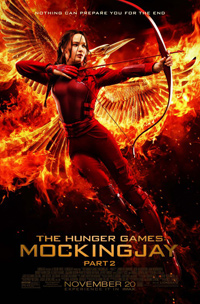To Kill a Mockingjay: Lawrence Brings YA Franchise to Inevitable Denouement
 The last tony gasp of Suzanne Collins’ celebrated Hunger Games franchise is steered, at long last, to a close courtesy of director Francis Lawrence, who has been responsible for three film entries in the quartet. In the tradition of several other series, the final novel was split into two separate films released a year apart in order to capitalize on the popular momentum of the property, a trick which only does a severe disservice to the longevity of this YA dystopia.
The last tony gasp of Suzanne Collins’ celebrated Hunger Games franchise is steered, at long last, to a close courtesy of director Francis Lawrence, who has been responsible for three film entries in the quartet. In the tradition of several other series, the final novel was split into two separate films released a year apart in order to capitalize on the popular momentum of the property, a trick which only does a severe disservice to the longevity of this YA dystopia.
Familiar and recycled themes and ideas aside, it is one of the more moderately intelligent mainstream machines, but that’s not saying much. While the memory of 2014’s Mockingjay: Part 1 is left in the hazy dust of its unnecessarily elongated exposition, the final sequence fares better as a piece of entertainment thanks to some minor moments of tension scattered amongst moments of war time carnage testing the limits of a PG-13 rating. But even for those who haven’t read the novels, it’s hard not to find this highly anticipated finale as disappointingly predictable and disheartening. After all is said and done, it seems abject banality is in store for cinema’s toughest contemporary heroine, and thus is only another contrived exercise in our culture’s conditioned tradition of feminine roles after the dust settles.
As alliances continue to shift in the ongoing war against Panem’s supreme capital and its imperious leader, President Snow (Donald Sutherland), Katniss Everdeen (Jennifer Lawrence) has been reduced to a symbolic figurehead for District 13 leader Alma Coin (Julianne Moore). Customary for Katniss, she rebels against authority to join the uniting district armies so she can march straight into the capital and assassinate Snow with her own hands. But she soon realizes something more drastic must happen so Snow’s replacement isn’t another power hungry force intent on repeating a similar tradition of classist tendencies.
Try as it might with all its gloss and glamour, The Hunger Games still feels like an archaic understanding of a dystopic human universe, not unlike something Ayn Rand would have cooked up had she dabbled in sci-fi and understood where technological advances ended up. Which means everything about this extensive examination of capitalism’s more ruinous tendencies and the age old face-off between rich man poor man is brought to a pat resolution, and adapting screenwriters Danny Strong and Peter Craig can’t shake off the simplified adolescence of Collins’ scenario.
It’s difficult to feel enthusiasm for the grimly determined Jennifer Lawrence, who seems equally bored with the forced romantic entanglements involving Chris Hemsworth and Josh Hutcherson. In fact, her most emotive moment is a rather over-the-top scene she shares with a chatty feline. Across the span of four films, believable emotional interactions have not been a staple of the franchise, including a manufactured love triangle and the taken-for-granted sisterly affections of Katniss and Primrose. And thus, at least in a cinematic sense, Katniss is a character stuck in a perpetual rut as a working class symbol defiantly challenging the privilege of the Capital, a group of one percenters only concerned with continued domination and ambivalent apathy for the lives of anyone else. And despite challenging the status quo, including as a female characterization untethered to general stereotypes of damsel-in-distress, the final chapter of her legacy offers up the same monotonous flourishes.
Energetic supporting players, like Jena Malone, (looking as if she’s been transported from the Blue Sunshine continuum), and an increasingly wicked Donald Sutherland (landing a bit more screen time this time around), make up for some rather ho-hum bits with Julianne Moore, Woody Harrelson, Sam Claflin, Jeffrey Wright, Mahershal Ali, and Elizabeth Banks. Most woeful is the film’s notable distinction as the very last theatrical release to feature Philip Seymour Hoffman, appearing in several short scenes here, and unnecessarily etched into one final ‘moment.’
James Newton Howard provides a leading score, albeit one usurping tension during key sequences, such as the film’s most notable moment of action modeled after James Cameron’s Aliens (1986) as the band of rebels are accosted by vicious, subterranean creatures called ‘mutts.’ Director Francis Lawrence, who has been shackled to the series since taking over from Gary Ross’ first film in 2012, has had the luxury of working with all the bells and whistles an annual built in audience permits a studio feature. But to sit through the end of the lengthy credits is more awe inspiring than the events depicted in Mockingjay: Part 2. Though far and away better than the similar teen dream supreme Twilight films, shouldn’t the final gasp of such a prolific franchise leave audiences with a feeling a bit better than “Meh?”
★★/☆☆☆☆☆


